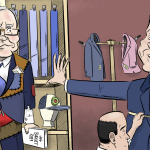The novel is largely based on Niland’s own experiences as a swaggie during the Great Depression. It’s about the fellowship that can be found among those down on their luck, and also the emotional and practical hurdles facing a knockabout Australian bloke who’s unprepared for his little girl’s love.
Monash oral historian Alistair Thomson is leading a research project into the history of Australian fatherhood over the past 100 years. He says that for many families the Depression was arguably more influential than the two world wars in framing how Australian men viewed their paternal responsibilities.

“Either the reality of mass unemployment or the spectre of mass unemployment really affects families and family memories for at least a generation,” Professor Thomson says. “One of the reasons you want to hold down a secure job in the ’40s, ’50s and early ’60s is because you remember how tough it was for your dad when he was in and out of work, and what sort of impact that had on your family.”
Professor Thomson’s Australian Research Council project will look at Australian fatherhood from 1919 – following the end of WWI – to the present day. He’ll be leading a team of researchers: John Murphy from the University of Melbourne, Michael Roper from Essex University, and Kate Murphy, Johnny Bell and PhD student Jill Barnard from Monash.
The researchers will use existing archives. Their sources will range from soldiers’ letters and oral history records held by the Australian War Memorial and the National Library, to parliamentary inquiries and royal commissions – including the Royal Commission into Human Relationships. This was initiated by the Whitlam Government in 1974, and it explored (among other things) how feminism, and the pill, affected the traditional family unit.
Ordinary lives, extraordinary circumstances
Oral history gives historians access to “intimate personal life – family relationships, for example – or the people who don’t create written records of the kind that historians can find”, Professor Thomson says.
“I’m interested in so-called ordinary lives, because that’s what the world is made up of – you realise that within those lives there can be extraordinary circumstances.”
The researchers have roughly divided the century into five sections.
There’s the interwar period, when the soldiers came home, then the Great Depression, “which destroys family life in all sorts of ways”.
This ends in “WWII, another moment of extraordinary disruption of family life and relationships – a restructuring of who does what in the home when so many men are absent”. After the war, conventional family life was “reconstituted, partly because all these men were coming back and wanting jobs”.
Women who had been lured to factories and farms to help with the war effort were then encouraged to return home with the children.
Feminists have seen this as a backwards step, but Professor Thomson argues that for some women who had been “working, raising kids” during the war, it “was a huge relief not to have to manage all that”.
“I’m interested in so-called ordinary lives, because that’s what the world is made up of – you realise that within those lives there can be extraordinary circumstances.”
Then come the boom years, from the ’50s to mid-’70s. Professor Thomson describes them as a time that was “unusual in Australia’s economic long-term history, where it’s possible for a family to live off one working-class person’s full-time wage”.
This is “the moment where a gender-divided model becomes entrenched”, as it did in many Western nations. He argues that the Australian experience was particularly acute.
“Our colonial history complicates things – for a time it’s a male-dominated society, both demographically and culturally,” he says.
The 1907 Harvester wage ruling was also influential. It set a minimum basic wage at a level that allowed an unskilled working man to support, house and clothe a wife and three children.
“It enshrines the male breadwinner within arbitration and wage systems, and that influences welfare systems as well,” Professor Thomson explains. “So all those cultural ideas about men being breadwinners and women being at home become embedded.

“It creates a system where women’s pay is always going to be inferior – and therefore if a couple is making a decision about who is going to work, it’s no decision, really, if a bloke can earn twice as much.”
The women’s movement, equal pay, no-fault divorce, childcare allowances and the single-parent payment all disrupted the traditional family unit from the 1970s – and continue to do so. But Professor Thomson argues that while a world of possibilities opened for women, fathers were – generally speaking – far less affected by the shifting social currents.
Why?
Men are influenced by their fathers, which means, for instance, that many men who became fathers in the ’70s and ’80s “are almost invariably remembering their childhood in that post-war period, when dad was the breadwinner and mum was at home”, he says.
“They may have been economically secure, but they’re also thinking, ‘My dad was always at work, he was a bit distant, I never had any emotional quality time, I’ll try and be a different sort of father’. Hence they go to the birth and change some nappies, and so on …
“They want to be more engaged and involved, but the economics and the practicality limited the opportunities for most men – and they still do.”
Exceptions to the rule
There are, of course, many exceptions to the conventional template – and perceptions of fathers have also shifted. In the ’20s and ’30s, if an Australian father became a widower, he risked losing his children. Johnny Bell’s previous PhD research showed that during the interwar years, single men were considered unfit parents, and if a father failed to remarry, or did not have a mother or sister willing to help, their sons or daughters ended up in orphanages.
In real life, Buster would probably never have been able to stay with Macauley, even if her dad had a steady job.
“That has certainly changed to a large degree,” Professor Thomson says. “But it doesn’t mean that the political, economic and social structures make it easy” for fathers to earn money and to look after children. Even in two-parent households, economic necessity, social expectations and workplace imperatives “don’t make it easy for parents to share care”.
This article was published by Lens.
















